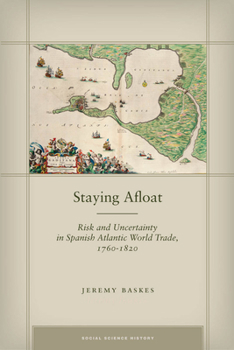Staying Afloat: Risk and Uncertainty in Spanish Atlantic World Trade, 1760-1820
(Part of the Social Science History Series)
Early modern, long-distance trade was fraught with risk and uncertainty, driving merchants to seek means (that is, institutions) to reduce them. In the traditional historiography on Spanish colonial trade, the role of risk is largely ignored. Instead, the guild merchants are depicted as anti-competitive monopolists who manipulated markets and exploited colonial consumers. Jeremy Baskes argues that much of the commercial behavior interpreted by...
Format:Hardcover
Language:English
ISBN:0804785422
ISBN13:9780804785426
Release Date:July 2013
Publisher:Stanford University Press
Length:408 Pages
Weight:1.46 lbs.
Dimensions:1.1" x 6.1" x 9.3"
Customer Reviews
0 rating





